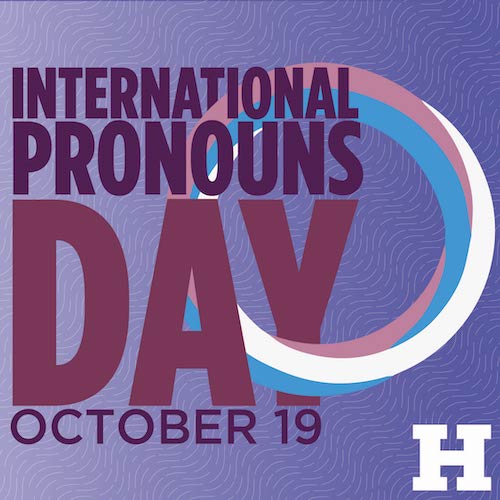UHart Celebrates International Pronouns Day 2022 - Oct. 19

International Pronouns Day is held the third Wednesday of October each year and seeks to make respecting, sharing, and educating about personal pronouns commonplace. Referring to people by the pronouns they determine for themselves is basic to human dignity. Being referred to by the wrong pronouns particularly affects transgender and gender nonconforming people. Together, we can transform society to celebrate people’s multiple, intersecting identities. Source: https://pronounsday.org/
The Office of Diversity, Equity, and Community Engagement seeks to bring visibility to the gender diversity that exists on our campus, by increasing awareness and understanding of the importance of respecting and using the correct pronouns when referring to others. The information below and the attached Gender and Pronoun Guide were compiled using several sources in an effort to provide a starting point of useful information for the learning, living, and working environment. These are not intended to be an all-encompassing or exhaustive guide to gender and pronouns, but a starting point for personal education and cultural transformation. We welcome feedback and input to further and/or improve this resource.
Campus community members can update their preferred name, gender identity, and personal pronouns via the "Personal Information" tab on Self-Service (learn more here). Individuals are also invited to include their pronouns in the following mediums to promote visibility and inclusion:
- During introductions at the beginning of classes and/or meetings
- With their name on Zoom
- In their email signature
Why is it important to respect people’s pronouns?
You can’t always know what someone’s pronouns are by looking at them. Asking and correctly using someone’s pronouns is one of the most basic ways to show your respect for their gender identity.
When someone is referred to with the wrong pronoun, it can make them feel disrespected, invalidated, dismissed, alienated, or dysphoric ( often all of the above). All major professional American psychological and psychiatric associations recognize that inclusive language usage for LGBTQ+ youth and adults drastically decreases experiences of depression, social anxiety, suicidal ideation, and other negative mental health factors.
It is a privilege to not have to worry about which pronoun someone is going to use for you based on how they perceive your gender. If you have this privilege, yet fail to respect someone else’s gender identity, it is not only disrespectful and hurtful, but also oppressive.
Source: https://uwm.edu/lgbtrc/support/gender-pronouns/
Practices for Inclusion
Ask: You can’t assume someone’s name or pronouns just by looking at them. Politely and privately as a person what pronouns they use. Examples of respectful ways to ask include: “What pronouns do you use?” “Would you remind me what pronouns you use?”
Respect: If someone offers the time and trust to let you know their authentic name and personal pronouns, use and respect what they have shared. It’s not up to you to decide someone else’s identity.
Practice: If you have difficulty using someone’s pronouns and name, practice. Ask colleagues, peers, and friends to point out when you’ve made a mistake.
Source: http://lightupthesky.ca/wp-content/uploads/2015/11/LUTS_519_Infographic_NeutralPronouns.png
What if you make a mistake?
Everyone slips up from time to time. The best thing to do if you use the wrong pronoun for someone is to say something right away, like “Sorry, I meant (insert pronoun)” and keep the conversation moving forward. If you realize your mistake after the fact, apologize in private and move on.
A lot of the time it can be tempting to go on and on about how bad you feel that you messed up or how hard it is for you to get it right. Please don’t! It is inappropriate and makes the person who was misgendered feel awkward and responsible for comforting you, which is absolutely not their job.
You may hear someone using the wrong pronoun for another individual. In most cases, it is appropriate to gently correct them without further embarrassing the individual who has been misgendered. This means saying something like “Alex uses the pronoun she,” and then moving on. If others are consistently using the wrong pronouns for someone, do not ignore it! It is important to let that person know that you are their ally.
It may be appropriate to approach them and say something like “I noticed that you were getting referred to with the wrong pronoun earlier, and I know that that can be really hurtful. Would you be okay with me taking them aside and reminding them about your pronouns?” Follow up if necessary, but take your cues from the comfort level of the person being misgendered.
Source: https://uwm.edu/lgbtrc/support/gender-pronouns/
Resources for further learning
- International Pronouns Day website
- GLSEN Pronoun Guide
- Practice with Pronouns
- What are personal pronouns and why do they matter?
- What are pronouns? (video)
- Why Gender Pronouns Matter | Mala Matacin | TEDxHartford (video)
Questions, feedback, or suggestions? Contact:
Christine Grant, Assistant Vice President of Diversity, Equity, and Community Engagement: cgrant@hartford.edu or 860-768-4220
Lisa Coté, Assistant Director of Diversity, Equity, and Inclusion: licote@hartford.edu or 860-768-4932